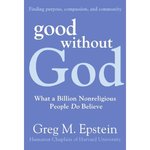Good without God
Greg Epstein
Tuesday, 12 Mar 2013 at 8:00 pm – Great Hall, Memorial Union
Greg M. Epstein serves as the Humanist Chaplain at Harvard University and is the author of Good Without God: What a Billion Nonreligious People Do Believe. He currently serves as vice president of the thirty-six-member corps Harvard Chaplains. In 2005 Epstein received ordination as a Humanist Rabbi from the International Institute for Secular Humanistic Judaism, through which he studied in Jerusalem and Michigan for five years. He holds a bachelor's in religion and Chinese, and a masters in Judaic Studies from the University of Michigan, and a Masters of Theological Studies from the Harvard Divinity School. Part of the National Affairs Series.Greg Epstein grew up in Flushing, Queens, New York as an assimilated and disinterested Reform Jew. He studied Buddhism and Taoism while at Stuyvesant High School in New York City and in college went to Taiwan for a semester aiming to study Ch’an (Zen) Buddhism in its original language and context. Finding that Eastern religions do not necessarily have greater access to truth than Western ones, he returned to the United States and shifted his focus.
Cosponsored By:
- LAS Miller Lecture Fund
- National Affairs
- Philosophy & Religious Studies
- Committee on Lectures (funded by Student Government)
Stay for the entire event, including the brief question-and-answer session that follows the formal presentation. Most events run 75 minutes.
Sign-ins are after the event concludes. For lectures in the Memorial Union, go to the information desk in the Main Lounge. In other academic buildings, look for signage outside the auditorium.
Lecture Etiquette
- Stay for the entire lecture and the brief audience Q&A. If a student needs to leave early, he or she should sit near the back and exit discreetly.
- Do not bring food or uncovered drinks into the lecture.
- Check with Lectures staff before taking photographs or recording any portion of the event. There are often restrictions. Cell phones, tablets and laptops may be used to take notes or for class assignments.
- Keep questions or comments brief and concise to allow as many as possible.




